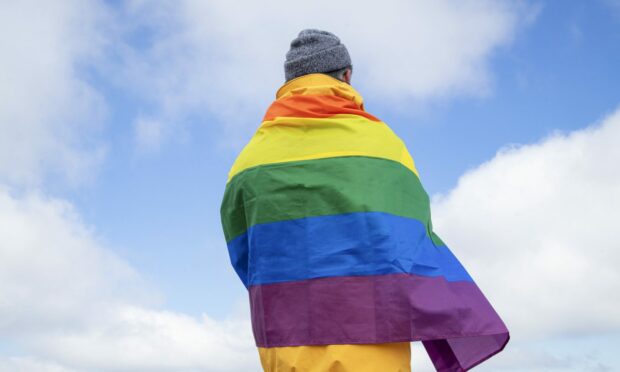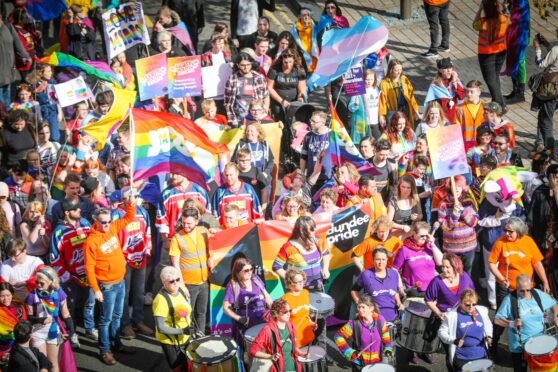LGBT+ campaigners have criticised suggestions a ban on conversion therapy could be a breach of people’s rights to religious freedom.
For the past few months the Scottish Parliament’s equalities committee has been hearing from people who want to ban the controversial practice, which includes “therapy” aiming to change or suppress a person’s sexual orientation or gender identity.
However the committee has been told by a group of religious leaders that a complete ban on conversion therapy could breach people’s human rights and “criminalise” praying.
End Conversion Therapy Scotland says any ban will not infringe on religion, adding conversion therapy is harmful in all its forms.
People could be ‘criminalised’ for praying
The religious leaders speaking at the Holyrood committee say they worry that if there is not a clear definition of what is and is not classed as conversion therapy, some religious practices such as praying could become criminalised.
Anthony Horan, director of the Catholic Parliamentary Office, said: “As a church, the ordinary day-to-day life is worship, pray and preach.
“That is what we do, and there is a genuine concern that some of that comes under the sweeping definition of conversion therapy, and that prayers and pastoral guidance is harming people.
“Criminalising ordinary women and men for praying, explaining religious teachings and offering appropriate care seems disproportionate.”
The religious representatives say they worry if the right to pray is suppressed by the proposed ban on conversion therapy, it could be a breach of the European Convention of Human Rights.
Dr Ahmed Shaheed, the UN special rapporteur on freedom of religion or belief, has previously said there is no conflict between a ban on conversion therapy and religious freedom.
Parents fearful of accusations
Concerns were also raised about the impact this would have on parents, with some saying it would restrict their ability to openly discuss sexuality and gender identity.
Piers Shepherd, a senior researcher for the Family Education Trust, said: “The law needs to protect the rights of parents to bring up their children in a way that is consistent with their moral or religious beliefs.
“Parents might not discuss sexuality or gender with their children for fear of being accused of doing conversion therapy.
“Children and young people growing up often have questions around sexuality and identity, and it is important they are supported to explore those feelings without the fear of those providing the support being accused of conversion therapy.”
Mr Shepherd says he worries if the definition of conversion therapy is too broad, it would criminalise everything that is not “immediate acceptance and celebration of sexual identity”.
Peter Lynas, UK director of the Evangelical Alliance, also spoke at the committee and has previously written to Boris Johnson setting out his concerns about protecting religious freedom in any conversion therapy ban.
He says the most extreme forms of conversion therapy, such as corrective rape, are already covered by many existing laws, and says if a complete ban comes into force, some might end up getting absolutely no help at all.
He also says people should be allowed to consent to something that others might disagree with.
There was also a call to ensure any ban also covers those being pushed into identifying as LGBT+, and discussions about religious groups such as Courage and Living Out, which encourage LGBT+ people to be celibate.
Conversion therapy ‘harmful in all forms’
However End Conversion Therapy Scotland, the group campaigning for a ban to be enshrined in law, say people cannot consent to something that is torturous and harmful.
Sophie Duncan from the group said: “We would contest this, there is no conflict here with religious freedom.
“We have seen the tired argument about parental rights and parents knowing best and having unrestricted rights to do things to their children which completely ignores the harm caused to children by conversion therapy.
The right to bring your children up according to your beliefs is not – and should never be – the right to abuse your child or subject them to cruel and degrading treatment.
We fundamentally disagree with Piers Shepherd of the Family Education Trust here. https://t.co/KtN7v9r5BZ
— End Conversion Therapy Scotland (@ECTScotland) November 16, 2021
“Conversion therapy does happen and it is not functionally banned in this country.
“You can’t consent to torture or practices that are deeply harmful with no therapeutic benefit.
“The vast majority that consent to this are coerced into this by religion and the people around them.
“Conversion therapy is harmful in all its forms.”

